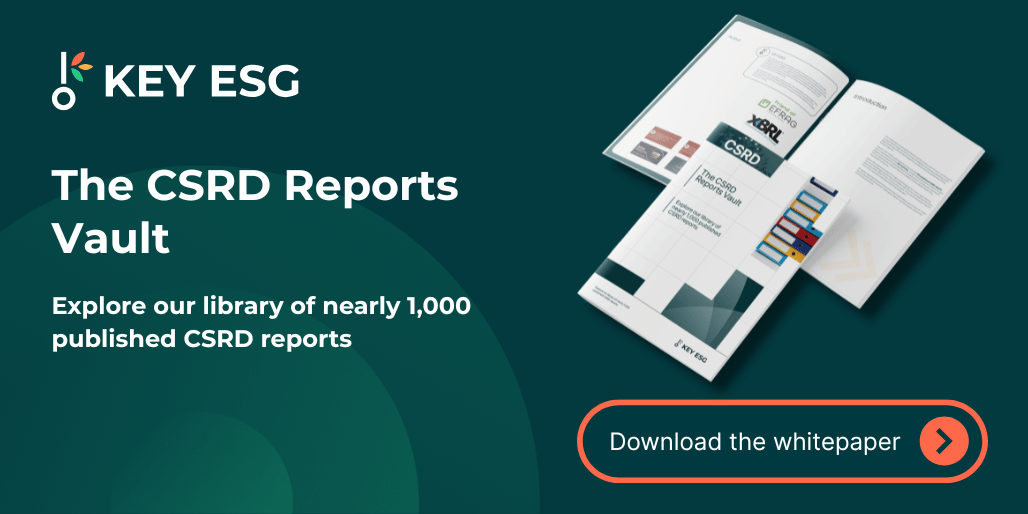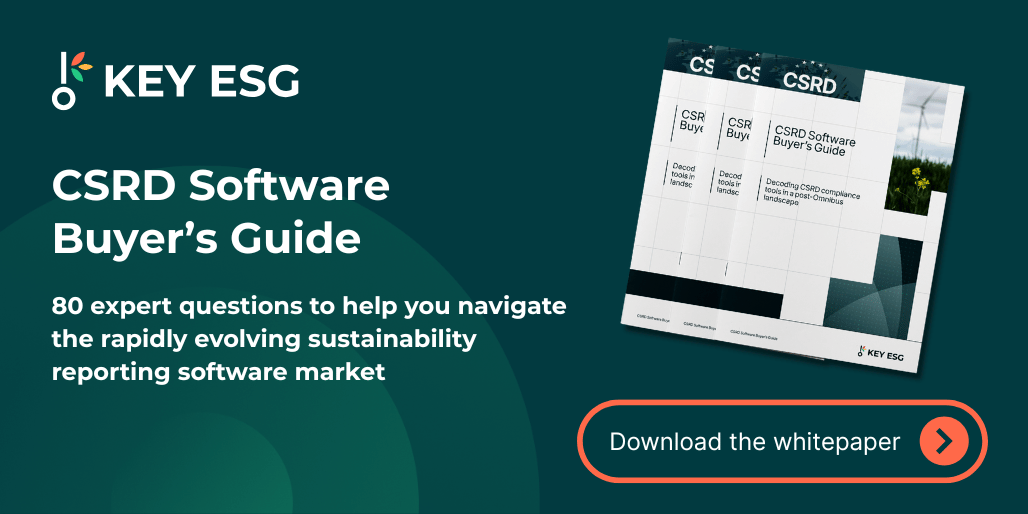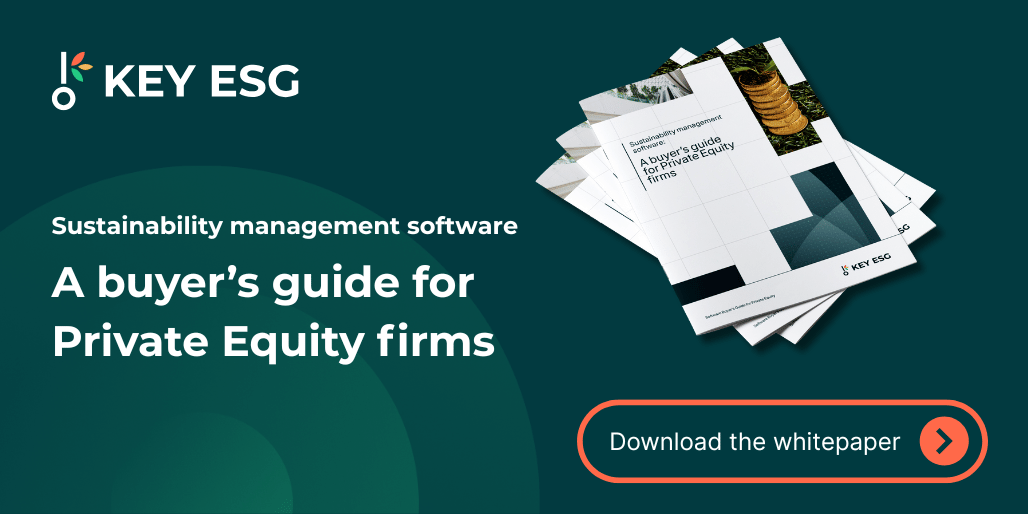
In recent months, global momentum around carbon reduction has accelerated, marked by the launch of CSRD in the EU, the adoption of IFRS S1 and S2 standards in many countries and the agreements made at COP28. Alongside this, there is a growing demand from investors and stakeholders for investment-grade sustainability reporting, with a focus on carbon. As a result, organisations must revisit their carbon accounting strategy and assess if it lays the foundations for their organisation to successfully move into this new era of increased scrutiny and focus on carbon emission reporting and reduction.
Increasing scrutiny from consumers, investors, and regulators pushes companies beyond compliance and toward strategic carbon emission reduction strategies. Accurate and automated carbon accounting platforms provide a centralised location for carbon data and enable an organisation to quantify and manage its greenhouse gas emissions. In this shifting landscape, embracing robust carbon accounting practices isn’t just a regulatory necessity—it’s a chance to build trust, demonstrate accountability, and transform carbon strategy into a meaningful competitive advantage.
Just as financial accounting is critical for understanding organisational value, accurate carbon accounting is essential for tracking climate impact. Understanding and quantifying an organisation’s climate impact is crucial for setting reduction goals and demonstrating commitment to decarbonisation.
Why the focus on Scope 3 carbon accounting?
Since Scope 3 emissions usually comprise the most significant proportion of a company’s carbon footprint and are the most complex to calculate accurately, Scope 3 should be an area of particular focus in a business’s carbon strategy.
This whitepaper is for organisations looking to get started on Scope 3 emission calculation and reporting. It provides definitions and explanations of the 15 sub-categories within Scope 3 and begins to unpick the question of where to start. Depending on the industry your company is in, the materiality of the 15 categories will vary.
This whitepaper provides a step-by-step guide to calculating that materiality and helpful considerations when laying the foundations of your Scope 3 calculation process. We work with organisations across all industries and sizes to ensure they have the proper carbon reporting process, considering the growing legal obligations to report greenhouse gas emissions.
Download this whitepaper to learn more about the relevant process for your business. Understanding carbon accounting methods, including spend-based and activity-based techniques, can significantly enhance the accuracy and comprehensiveness of your carbon footprint calculations.
Contents:
Part 1: What are Scope 3 emissions?
Part 2: The 15 categories and their data requirements.
Part 3: Assessing materiality and how to get started.
Part 4: How KEY ESG can help.
What are Scope 3 emissions?

Scope 3 emissions are all indirect greenhouse gas (GHG) emissions that occur across a company’s value chain, excluding those from owned or controlled sources (Scope 1) and indirect emissions from purchased energy (Scope 2). These supply chain emissions result from activities such as the production of purchased goods, business travel, use of sold products, transportation, waste disposal, and investments.
The 15 Scope 3 categories and their emissions data requirements

The GHG Protocol defines 15 distinct Scope 3 categories to cover upstream and downstream activities and other indirect emissions. Each category presents unique data challenges, boundaries, and calculation methodologies for emissions produced. For example:
Understanding the specificity of each category’s data requirements is crucial for ensuring reporting accuracy and alignment with global standards such as ISO 14064-1, the Partnership for Carbon Accounting Financials (PCAF), and regulatory initiatives like the CSRD.
Assessing materiality and how to get started

Materiality assessment determines which of the Scope 3 categories are most relevant, significant, and impactful for a specific organisation. This involves evaluating emissions magnitude, data availability, stakeholder expectations and financial relevance. Prioritisation enables companies to allocate resources effectively and focus reduction efforts on emission sources with the highest strategic value.
Establishing a Scope 3 emissions program requires defining organisational and reporting boundaries, selecting appropriate calculation methods (e.g., spend-based, supplier-specific, hybrid), and engaging with supply chain partners for data transparency. Early-stage implementation can rely on secondary emission factors, while mature programs benefit from primary supplier data and automated carb/on accounting systems.
Unlock the full Scope 3 playbook and transform data into action.
Need carbon accounting software to help you automate your greenhouse gas protocol and report your company’s greenhouse gas emissions?
KEY ESG offers a comprehensive corporate carbon accounting platform to help you manage your climate-related risks, track total greenhouse gas emissions, and simplify sustainability. Request a demo today.
In recent months, global momentum around carbon reduction has accelerated, marked by the launch of CSRD in the EU, the adoption of IFRS S1 and S2 standards in many countries and the agreements made at COP28. Alongside this, there is a growing demand from investors and stakeholders for investment-grade sustainability reporting, with a focus on carbon. As a result, organisations must revisit their carbon accounting strategy and assess if it lays the foundations for their organisation to successfully move into this new era of increased scrutiny and focus on carbon emission reporting and reduction.
Increasing scrutiny from consumers, investors, and regulators pushes companies beyond compliance and toward strategic carbon emission reduction strategies. Accurate and automated carbon accounting platforms provide a centralised location for carbon data and enable an organisation to quantify and manage its greenhouse gas emissions. In this shifting landscape, embracing robust carbon accounting practices isn’t just a regulatory necessity—it’s a chance to build trust, demonstrate accountability, and transform carbon strategy into a meaningful competitive advantage.
Just as financial accounting is critical for understanding organisational value, accurate carbon accounting is essential for tracking climate impact. Understanding and quantifying an organisation’s climate impact is crucial for setting reduction goals and demonstrating commitment to decarbonisation.
Why the focus on Scope 3 carbon accounting?
Since Scope 3 emissions usually comprise the most significant proportion of a company’s carbon footprint and are the most complex to calculate accurately, Scope 3 should be an area of particular focus in a business’s carbon strategy.
This whitepaper is for organisations looking to get started on Scope 3 emission calculation and reporting. It provides definitions and explanations of the 15 sub-categories within Scope 3 and begins to unpick the question of where to start. Depending on the industry your company is in, the materiality of the 15 categories will vary.
This whitepaper provides a step-by-step guide to calculating that materiality and helpful considerations when laying the foundations of your Scope 3 calculation process. We work with organisations across all industries and sizes to ensure they have the proper carbon reporting process, considering the growing legal obligations to report greenhouse gas emissions.
Download this whitepaper to learn more about the relevant process for your business. Understanding carbon accounting methods, including spend-based and activity-based techniques, can significantly enhance the accuracy and comprehensiveness of your carbon footprint calculations.
Contents:
Part 1: What are Scope 3 emissions?
Part 2: The 15 categories and their data requirements.
Part 3: Assessing materiality and how to get started.
Part 4: How KEY ESG can help.
What are Scope 3 emissions?

Scope 3 emissions are all indirect greenhouse gas (GHG) emissions that occur across a company’s value chain, excluding those from owned or controlled sources (Scope 1) and indirect emissions from purchased energy (Scope 2). These supply chain emissions result from activities such as the production of purchased goods, business travel, use of sold products, transportation, waste disposal, and investments.
The 15 Scope 3 categories and their emissions data requirements

The GHG Protocol defines 15 distinct Scope 3 categories to cover upstream and downstream activities and other indirect emissions. Each category presents unique data challenges, boundaries, and calculation methodologies for emissions produced. For example:
Understanding the specificity of each category’s data requirements is crucial for ensuring reporting accuracy and alignment with global standards such as ISO 14064-1, the Partnership for Carbon Accounting Financials (PCAF), and regulatory initiatives like the CSRD.
Assessing materiality and how to get started

Materiality assessment determines which of the Scope 3 categories are most relevant, significant, and impactful for a specific organisation. This involves evaluating emissions magnitude, data availability, stakeholder expectations and financial relevance. Prioritisation enables companies to allocate resources effectively and focus reduction efforts on emission sources with the highest strategic value.
Establishing a Scope 3 emissions program requires defining organisational and reporting boundaries, selecting appropriate calculation methods (e.g., spend-based, supplier-specific, hybrid), and engaging with supply chain partners for data transparency. Early-stage implementation can rely on secondary emission factors, while mature programs benefit from primary supplier data and automated carb/on accounting systems.
Unlock the full Scope 3 playbook and transform data into action.
Need carbon accounting software to help you automate your greenhouse gas protocol and report your company’s greenhouse gas emissions?
KEY ESG offers a comprehensive corporate carbon accounting platform to help you manage your climate-related risks, track total greenhouse gas emissions, and simplify sustainability. Request a demo today.





